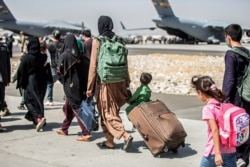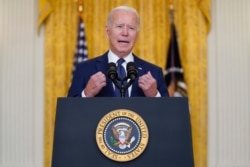The U.S. Defense Department said Saturday that an American airstrike Friday against an Islamic State Afghan affiliate resulted in the deaths of two important members of the group.
“Two high-profile ISIS targets were killed, and one was wounded, and we know of zero civilian casualties,” Pentagon spokesman John Kirby said at a media briefing, using an alternative designation for the group.
Kirby would not discuss to what extent ISIS capabilities might have suffered as a result of the U.S. attack, but he said, “They lost a planner, and they lost a facilitator, and they’ve got one wounded. And the fact that two of these individuals are no longer walking on the face of the Earth — that’s a good thing.”
Taliban spokesman Zabihullah Mujahid reportedly denounced the U.S. airstrike, saying it was a “clear attack on Afghan territory,” according to Reuters. He also reportedly said the Taliban expect to take full control of the airport when U.S. forces complete their pullout from the country.
Less than 48 hours after the deadly explosion outside Kabul’s airport, U.S. military forces retaliated with a drone strike Friday on an Islamic State Afghan affiliate group known as Islamic State Khorasan, or ISIS-K. The U.S. strike targeted a person whom the military believed had been responsible for planning deadly attacks on the U.S. in Kabul.
“The unmanned airstrike occurred in the Nangarhar Province of Afghanistan,” Captain Bill Urban, a spokesman for the U.S. Central Command, said in a statement. “Initial indications are that we killed the target. We know of no civilian casualties.” It was not immediately clear if the target person was involved in planning the attack on Kabul’s airport.
ISIS-K has claimed responsibility for the devastating suicide bomber explosion on the perimeter of Kabul’s airport Thursday in which at least 170 Afghans and 13 U.S. service members were killed.
On Friday, the U.S. Embassy urged U.S. citizens to stay away from the Kabul airport because of security threats and to leave immediately if they were near any of four gates to the airport, according to a statement on the State Department’s website.
White House press secretary Jen Psaki said Friday that U.S. officials thought another terrorist attack in Kabul was “likely.”
Pentagon spokesman Kirby said at Saturday’s briefing that threats against the airport “are still very real, they’re very dynamic, and we are monitoring them literally in real time. And, as I said yesterday, we are taking all the means necessary to make sure we remain focused on that threat stream and doing what we can for force protection.”
The security threats have made the evacuation of Americans and some Afghans more difficult.
“There doesn’t appear to be any concerted effort to get SIVs [Special Immigrant Visa holders] out at this point,” a State Department official told VOA from Hamid Karzai International Airport. But the department is still trying to evacuate local embassy staff, U.S. citizens and legal permanent residents.
Evacuation efforts
The U.S. evacuation of Afghans at the airport has wound down significantly, with most of the remaining 100 American civilian government staffers set to leave before midnight, according to a State Department official who spoke Saturday with VOA on the condition of anonymity.
The airport terminals are mostly empty, said the official, who expressed mixed feelings about the operation.
“I feel the frustration of the failure of the operation overall,” said the official, who described the decision-making process of getting Afghans evacuated as “chaotic” and “subjective.”
“But I'm extremely proud of the work of the guys on the ground, just the kind of bare-knuckled diplomacy of getting to know the Afghans, even though some of us didn't know the language,” the official said.
Britain, meanwhile, said Saturday it would halt flights to evacuate civilians and started bringing its troops and diplomats back to the country. Britain reported late Friday it had evacuated more than 14,500 Afghan and British nationals since the Taliban seized control of the country two weeks ago.
Britain ended the evacuations a day after Defense Secretary Ben Wallace announced “with deep regret” that Britain has stopped processing people for evacuation from Kabul, and he noted that many British citizens and Afghans who had worked with Britain in Afghanistan would not be able to leave.
France previously announced that it is ending its evacuation process in Afghanistan.
Despite the risks, crowds of people desperate to leave Afghanistan gathered outside Kabul’s airport early Friday as evacuation flights resumed.
The Wall Street Journal reported the crowds dispersed later Friday amid rumors that another terror attack was imminent. A VOA reporter who visited the area late Friday morning saw mostly empty streets with Taliban security blocking access to streets near the airport.
The Taliban set up additional layers of checkpoints Saturday on roads leading to the airport to prevent large crowds from gathering after the suicide attack, according to the Associated Press. Areas outside the airport, where crowds gathered for two weeks before the attack, reportedly were largely empty.
NATO’s top civilian representative to Afghanistan said Saturday the alliance did its best to evacuate as many people as possible after the Taliban took control of the country.
"We have a clean conscience ... because with what we had, we did our best under the circumstances," Italian diplomat Stefano Pontecorvo told reporters at an airport in Rome.
Pontecorvo returned to Italy on the country’s last flight to evacuate Afghan refugees. Fifty-eight Afghan citizens were on board.
Before the retaliatory strike, U.S. President Joe Biden vowed vengeance on those responsible.
“To those who carried out this attack, as well as anyone who wishes America harm, know this: We will not forgive,” Biden said in a nationally broadcast address. “We will hunt you down and make you pay.”
Biden said he had ordered commanders to develop operational plans to strike ISIS-K assets, leadership and facilities, saying, “We will respond with force and precision at our time, at the place we choose and the moment of our choosing.”
When asked if the U.S. is capable of simultaneously planning and executing counterattacks while leading the evacuation, U.S. Army General Hank Taylor said at a briefing, “We have resources with the Centcom commander, with the commanders on the ground and the capabilities to allow us to execute any type of those operations.”
Biden vowed Thursday the evacuations would continue until the August 31 deadline to withdraw all troops. More than 20 allies helped with the evacuations. Most have completed their operations.
“We will get Americans out who want to get out,” the president said.
As the evacuation winds down, the United Nations Food and Agriculture Organization called for humanitarian aid Saturday to help more than 7 million Afghan farmers facing worsening drought conditions.
“Urgent agricultural support now is key to counter the impact of the drought and a worsening situation in Afghanistan’s vast rural areas in the weeks and months ahead, FAO Director Qu Dongyu said in a statement.
The FAO described the drought as “severe” and said its impact on Afghans is exacerbated by the displacement of people caused by the conflict and the economic impact of COVID-19.
The U.N. World Food Program estimated earlier this month that about one out of every three Afghans are in urgent need of food assistance.
VOA White House Correspondent Patsy Widakuswara contributed to this report. Some information came from The Associated Press, Agence France-Presse and Reuters.








